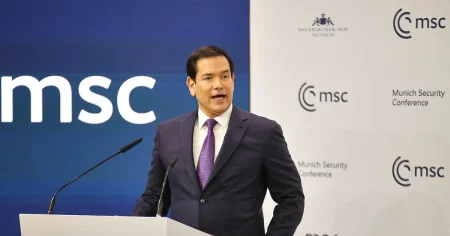The Intergovernmental Science-Policy Platform on Biodiversity and Ecosystem Services (IPBES), often referred to as the biodiversity equivalent of the climate panel IPCC, has released a groundbreaking report highlighting the interconnectedness of five major global environmental crises: climate change, biodiversity loss, food production, water security, and human health. These interconnected challenges, termed ”nexus components,” cannot be addressed in isolation without risking unintended negative consequences. The traditional ”siloed” approach to environmental management, focusing on individual issues rather than their complex interactions, is no longer sufficient. The IPBES report underscores the urgent need for integrated solutions that consider the synergistic effects of actions across these five crucial areas.
A prime example of the interconnectedness of these challenges lies in the cultivation of monoculture energy crops. While seemingly a positive step towards renewable energy, the report highlights potential negative consequences. If these crops require draining wetlands or deforestation, they can lead to biodiversity loss, disrupt natural water regulation, and reduce carbon sequestration. Furthermore, if land used for energy crops displaces land previously used for food production, it can threaten food security. This illustrates the delicate balance required to achieve positive outcomes across all nexus components, emphasizing the need for comprehensive assessments before implementing large-scale environmental interventions. The report stresses that seemingly beneficial actions in one area can have detrimental impacts on others if not carefully considered within a broader context.
The Nexus Assessment Report, a product of three years of rigorous research involving 165 experts from 57 countries and reviewing over 6,500 scientific references, not only identifies potential pitfalls but also offers a wide array of scientifically-backed strategies that can benefit multiple nexus components simultaneously. Restoring wetlands, for example, provides multiple benefits. It enhances climate change mitigation through carbon sequestration, increases biodiversity by providing habitat, improves water quality through natural filtration, and bolsters the land’s capacity to regulate water flow, thus reducing flood risks. Such integrated solutions, the report argues, offer a more effective and sustainable approach to tackling the interconnected environmental challenges facing the planet.
Despite the wealth of scientific evidence and the clear articulation of interconnected solutions presented in the thousands of pages of the scientific report, concerns arose regarding its accessibility and potential influence on policy decisions. Recognizing that few policymakers would likely delve into the comprehensive report, IPBES member countries worked to distill its key findings into a more concise 50-page summary. However, this summarization process proved challenging, with political considerations influencing the final document. Certain countries sought to downplay or remove specific findings, highlighting the tension between scientific evidence and political agendas.
The negotiations surrounding the summary revealed how political interests can attempt to manipulate scientific findings. For instance, Russia reportedly attempted to remove references to the negative environmental impacts of armed conflicts, while Brazil successfully removed the term ”climate change” from the summary’s title, though it remains prominently mentioned in the introductory paragraph. These instances underscore the challenges of translating scientific consensus into policy action, particularly when national interests clash with global environmental concerns. Despite these political maneuvers, the core message of the report, highlighting the crucial and often overlooked impact of climate change on all nexus components, remains intact.
The IPBES report emphasizes the urgency of moving beyond isolated solutions and embracing integrated approaches that acknowledge the interconnectedness of environmental challenges. It offers a valuable resource for policymakers, providing a scientifically-grounded framework for developing strategies that simultaneously address climate change, biodiversity loss, food security, water availability, and human health. The challenge now lies in translating these scientific findings into concrete policy actions at national and international levels, overcoming political hurdles and prioritizing the long-term health of the planet and its inhabitants. The report serves as a call to action, urging a shift towards integrated and holistic environmental management that considers the complex interplay between these critical issues. The next step involves adapting the report’s conclusions and recommendations to specific national contexts, paving the way for the implementation of targeted and effective environmental policies.














